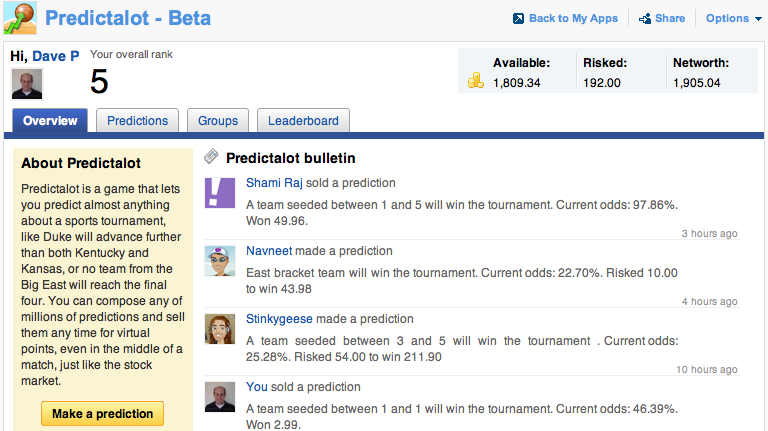 In the Book of Odds, you can find everything from the odds an astronaut is divorced (1 in 15.54) to the odds of dying in a freak vending machine accident (1 in 112,000,000).
In the Book of Odds, you can find everything from the odds an astronaut is divorced (1 in 15.54) to the odds of dying in a freak vending machine accident (1 in 112,000,000).
Book of Odds is, in their own words, “the missing dictionary, one filled not with words, but with numbers – the odds of everyday life.”
I use their words because, frankly I can’t say it better. The creators are serious wordsmiths. Their name itself is no exception. “Book of Odds” strikes the perfect chord: memorable and descriptive with a balance of authority and levity. On the site you can find plenty of amusing odds about sex, sports, and death, but also odds about health and life that make you think, as you compare the relative odds of various outcomes. Serious yet fun, in the grand tradition of the web.
I love their mission statement. They seek both to change the world — by establishing a reliable, trustworthy, and enduring new reference source — and to improve the world — by educating the public about probability, uncertainty, and decision making.
By “odds”, they do not mean predictions.
Book of Odds is not in the business of predicting the future. We are far too humble for that…
Odds Statements are based on recorded past occurrences among a large group of people. They do not pretend to describe the specific risk to a particular individual, and as such cannot be used to make personal predictions.
In other words, they report how often some property occurs among a group of people, for example the fraction all deaths caused by vending machines, not how likely you, or anyone in particular, are to die at the hands of a vending machine. Presumably if you don’t grow enraged at uncooperative vending machines or shake them wildly, you’re safer than the 1 in 112,000,000 stated odds. A less ambiguous (but clunky) name for the site would be “Book of Frequencies”.
Sometimes the site’s original articles are careful about this distinction between frequencies and predictions but other times less so. For example, this article says that your odds of becoming the next American Idol are 1 in 103,000. But of course the raw frequency (1/number-of-contestants) isn’t the right measure: your true odds depend on whether you can sing.
Their statement of What Book of Odds isn’t is refreshing:
Book of Odds is not a search-engine, decision-engine, knowledge-engine, or any other kind of engine…so please don’t compare us to Googleâ„¢. We did consider the term “probability engine†for about 25 seconds, before coming to our senses…
Book of Odds is never finished. Every day new questions are asked that we cannot yet answer…
A major question is whether consumers want frequencies, or if they want predictions. If I had to guess, I’d (predictably) say predictions — witness Nate Silver and Paul the Octopus. (I’ve mused about using *.oddhead.com to aggregate predictions from around the web.)
The site seems in need of some SEO. The odds landing pages, like this one, don’t seem to be comprehensively indexed in Bing or Google. I believe this is because there is no natural way for users (and thus spiders) to browse (crawl) them. (Is this is a conscious choice to protect their data? I don’t think so: the landing pages have great SEO-friendly URLs and titles.) The problem is exacerbated because Book of Odds own custom search is respectable but, inevitably, weaker than what we’ve become accustomed to from the major search engines.
Book of Odds launched in 2009 with a group of talented and well pedigreed founders and a surprisingly large staff. They’ve made impressive strides since, adding polls, a Yahoo! Application, an iGoogle gadget, regular original content, and a cool visual browser that, like all visual browsers, is fun but not terribly useful. They’ve won a number of awards already, including “most likely company to be a household name in five years”. That’s a low-frequency event, though Book of Odds may beat the odds. Or have some serious fun trying.






